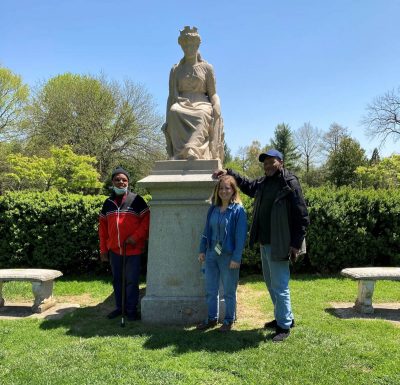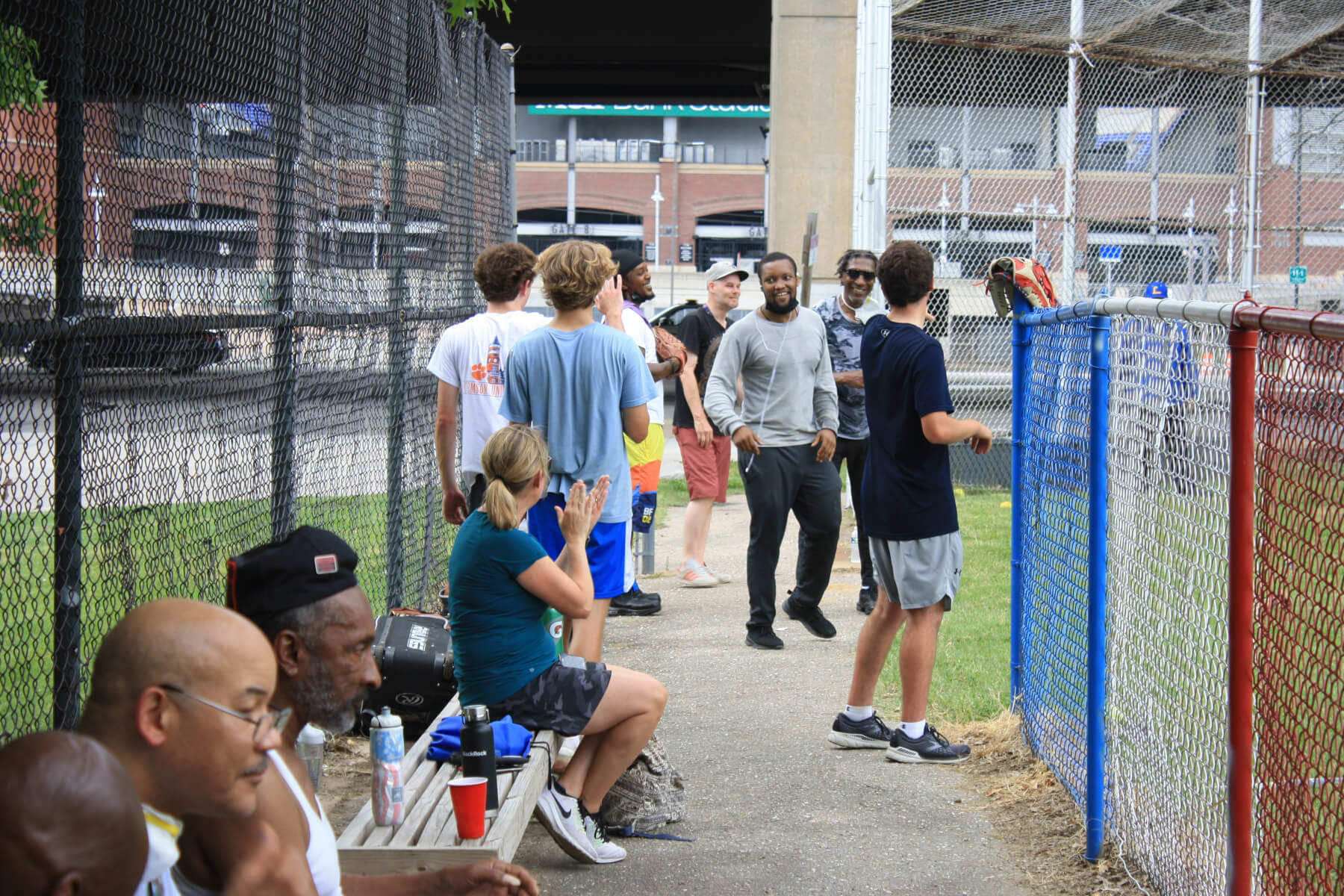Whether you’re experimenting with a new work life balance, moving houses, navigating family relationships, or just trying to meet new people, life is stressful. And if you don’t find a healthy way to cope with that stress, it could turn into something far worse.
Anxiety and depression can take over anyone. In the United States, an estimated 40 million people are struggling with some form of anxiety or depressive disorder (1). And going through a global pandemic certainly didn’t help to decrease those numbers. Taking on the stresses of life is all a part of the human experience, but how we respond is what we need to focus on. So what can you do?
One solution…get outside!
Ecotherapy is a formal therapeutic treatment that uses outdoor activities lead by a trained professional that combines interacting with others and interacting with the natural world. (4) Depending on the program, the activities can vary; from gardening to crafts and playing sports to sharing a meal. Although the activity level and structure can fluctuate, at the end of the day, the focus is on working together to complete a task surrounded by nature.
Styles of Ecotherapy
 Therapy Outside: Seeking help to resolve past traumas or current anxieties is a healthy response to being overwhelmed by stress. Talking to a professional can give you a new perspective and different solutions to what you are dealing with. Now imagine those regular therapy sessions, but in a new location. Moving therapy outside, allows the comforts of nature to further the growth from a therapy session.
Therapy Outside: Seeking help to resolve past traumas or current anxieties is a healthy response to being overwhelmed by stress. Talking to a professional can give you a new perspective and different solutions to what you are dealing with. Now imagine those regular therapy sessions, but in a new location. Moving therapy outside, allows the comforts of nature to further the growth from a therapy session.
Psychotherapist and adjunct clinical affiliate at the University of Texas at Austin, Saundra Jain, Psy.D., is a major supporter that simply moving outside can help to better resolve the issues afflicting her patients. She explains, “It’s hard to put into words exactly what it’s like, but overall I would say people are less defensive. They’re grounded and connected in a different way than when we’re in the office. It’s just a more natural interaction than sitting across from someone having a straight dialogue about their problems and difficulties.” (2)
Wilderness and Adventure Therapy: Wilderness and adventure therapies are centered around using nature, specifically unfamiliar surroundings, to address behavioral and mental health issues. Although they are most used for adolescents, these therapies have shown positive results in adults as well. Through primitive training and group exercises, harmful beliefs are often challenged leading to change or at least reflection on if those beliefs are actually working. (3)
The challenges faced in the wilderness are meant to emulate day to day struggles we all face, but in a setting free from judgment. This gives participants the opportunity to explore solutions and try new strategies. Skills gained through wilderness and adventure therapy include self-confidence, trust, ability to better communicate, and relationship building. (3)
Outdoor Activities: Spending time in a green space and increasing your interactions with the natural world has shown to not only help your physical wellbeing, but also your mental wellbeing. It helps to build confidence, lessen stress, improve physical health , reduce loneliness, and connect you with your local community. (5)
Working outside and with your hands can be a great way to connect with nature and bring peace to your mind. Spending too much time at your desk? Take a walk outside. Stressed about social media? Throw the ball around with your friends or family. Can’t stop thinking about the to do list you have been adding to for years? Mow the lawn and plant some flowers. Getting outside is a great way to connect with the rest of the world and relieve your anxieties.
How The Baltimore Station Incorporates the Outdoors into Therapy

Here at The Baltimore Station, we know there is not one right way to do therapy. For our program, clients are exposed to a vast array of therapies and counselling approaches. Each case manager here is given the freedom to lead their groups with different methods they have learned and researched over the years. Ecotherapy is one strategy that has definitely found a place here.
Now that the weather is looking nicer, some case managers have chosen to hold their group discussion outside. Case manager, Stephanie Hebb, LMSW, often holds group sessions outside and even did a walk through The Cylburn Arboretum to identify plants together and enjoy the peacefulness that nature provides.
We also take several annual trips away from The Station to expose clients to different surrounding and challenges. Twice a year we take all of our clients to Camp Puh’tok in Monkton, MD for a few days of outdoor education and adventure therapy. The men interact with animals, learn about nature, challenge themselves with outdoor activities like arrow shooting and zip lining, and work together to prepare a meal all while being in the great outdoors. Each time, the men come back with a greater appreciation for their recovery work and a new excitement for life. We are looking forward to our Sandy Point State Park beach trip coming up in July!
Sports have always been an integral part of recovery work at The Baltimore Station. They help build bonds between the men and remind everyone that leaning on each other is not only okay, but also a necessary part of life. Our volunteers play a huge role in this, helping to not only give more bodies for a team, but also a reminder that there is a community out there that our men will return to when they have completed their work here. From baseball to cornhole, volunteer groups like Loyola Blakefield, Back on my Feet, and Turner Construction Company are just a few examples of groups who have come out and brought outdoor activity to The Baltimore Station.
Need of the Week
This summer we are looking for groups and individuals to help offer our men more activities throughout their day. If there is an activity you love to do or you have a group looking to play sports or other activities outdoors, please reach out to lfrazier@baltimorestation.org to set up a volunteer activity.
Resources
(1) Hanson L.I.C.S.W., Jolene. “Identifying Anxiety, Depression Signs.” Mayo Clinic Health System, Mayo Clinic Health System, 4 May 2022, https://www.mayoclinichealthsystem.org/hometown-health/speaking-of-health/addressing-your-mental-health-by-identifying-the-signs-of-anxiety-and-depression
(2) Gordon, Deb, et al. “Your Care on Healthywomen’s Site.” HealthyWomen, 9 May 2022, https://www.healthywomen.org/your-care/.
(3) Team, GoodTherapy Editor. “Wilderness Therapy.” GoodTherapy, GoodTherapy, 1 Mar. 2016, https://www.goodtherapy.org/learn-about-therapy/types/wilderness-therapy.
(4) Executive summary. Ecotherapy, Mind, 2021. https://www.mind.org.uk/media/9661/ecotherapy-2021-pdf-for-download-pdf-version.pdf
(5) “How Nature Benefits Mental Health.” Mind, https://www.mind.org.uk/information-support/tips-for-everyday-living/nature-and-mental-health/how-nature-benefits-mental-health/

Leave A Comment
You must be logged in to post a comment.